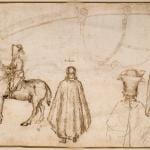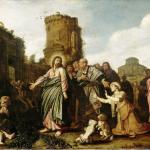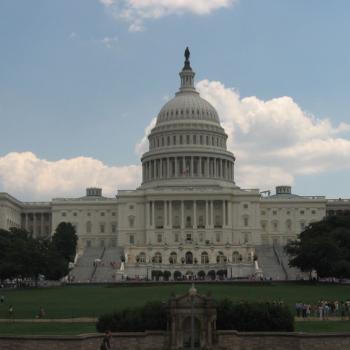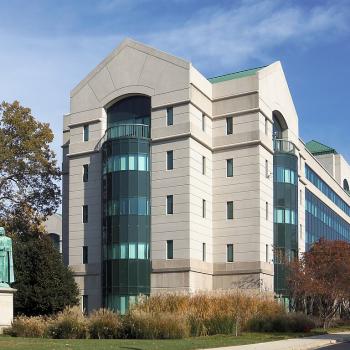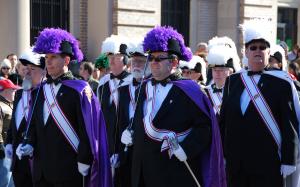
When someone criticizes the Knights of Columbus, an apologist will speak out and say the criticism is unjust and comes from someone who is anti-Catholic. It’s a common tactic. Instead of dealing with criticism, so-called apologists like to go on the attack. Calling someone anti-Catholic puts the other person on the defense, while the issues which have been raised become ignored. We can see this is what has happened when critics raise concerns with Catholics associated with a “Covenant Community.” The response is to ignore the concerns and suggests that underneath the criticism lies anti-Catholic hate.
The fact of the matter is that many Catholics have problems with the Knights of Columbus, and many Catholics have problems with various charismatic “Covenant Communities.” Such Catholics are not anti-Catholic, rather, they have various reasons for their criticism. Catholicism is not equated with these organizations and communities. Catholicism existed without them, and it can, and likely will continue without them in the future (for many such organizations come and go, but the Catholic Church remains). It is a sleight of hand to suggest criticism of those groups and communities is a criticism of Catholicism, because then it attributes more to these groups and communities then can and should be attributed to them. They become intricately linked to Catholicism, which will, of course, cause many Catholics who are not a part of them to ponder what that means.
Many right-wing Catholics have often tried to suggest that criticism of their political and cultural leanings are necessarily anti-Catholic. They often ignore attacks on Catholics when Catholics are promoting concerns that they do not care for, such as the church’s stand on the death penalty, social justice, or climate change. They want Catholicism to be viewed within the lens of right-wing ideology, even when such right-wing ideology runs contrary to Catholicism so they can shape the future of the church by influencing what future generations think the church teaches. This is how various groups have been able to circumvent Catholic moral teaching and reduce it to a few issues, such as abortion, causing great scandal to the church as they ignore the whole teaching of the church. This is also why they have reacted poorly to the sex-abuse scandals, trying to make it all about homosexuality instead of abuse and what structures have been put into power to cause such abuse.
We must be careful when we hear people shout “anti-Catholicism.” There can be, and is, real anti-Catholicism. Religious liberty of Catholics are under attack – by President Trump, whose policies punish Catholics and others who engage the corporal works of mercy for migrants. Has anyone from the Catholic League or the like spoken out against the violation of religious liberty when migrant women were forced to have hysterectomies against their wishes? Obviously, the violation of religious liberty in the Trump administration is not focused on Catholics, as Muslims and Native Americans can attest, but nonetheless the general disposition is to reject those rights when it goes against something which Trump wants.
This is the weird, Orwellian world we have come to live during the time of Trump, in which up is down, right is left, and those who go against Catholic teaching are given accolades for being great Catholics. We will hear more attempts to charge people as being anti-Catholic, who are not, because of their criticism, not of Catholicism, but of particular organizations, even as we will see such organizations, and people associated with them, criticize or attack the Catholicism of Catholics they do not like. Catholics are not univocal; even theologically, there is a great plurality: not everyone is a Thomist, nor is everyone even Roman Catholic. Catholics can and often do have differences in opinion, different ways in which they think things out for themselves, and those who would reduce Catholicism to one particular way of being are acting contrary the spirit of Catholicism which is for plurality in unity.
Nonetheless, given that plurality, this is not to say there cannot be internal debates, nor criticism given to those within the Catholic communion. Organizations which began good can go bad, especially if no one is criticizing them, making sure they do not go bad. This is the problem many have with the Knights of Columbus, and why they were not concerned with anti-Catholicism when Kamala Harris had questions concerning Brian Buescher’s membership with the Knights of Columbus. They realize the organization is using its Catholicism to promote a right-wing political agenda. Recently, Fr. Peter Daly realized this and so explained that he left the Knights of Columbus because of the agenda he saw coming from its leadership:
Because the top brass of the Knights of Columbus (known as the Supreme Council) injected the Knights into a partisan campaign at a moment of crisis in our national life. They politicized the order and took the side of racial bigotry and the violation of the constitutional and human rights of American citizens. They invited President Donald Trump to use the St. John Paul II National Shrine in Washington, D.C., as a prop for a photo for his political campaign. They did it at a moment of national crisis, the day after he had used St. John’s Episcopal Church in Washington, D.C., as a prop.[1]
Many who are Knights, of course, do not follow the ideologies of the Supreme Council; indeed, many of them do not know the ideologies being promoted by the organization. Many Knights see the Knights of Columbus as a social organization for Catholic men. They have pancake breakfasts. They have fellowship. They engage in acts of charity. But all of this has been used by the leadership, as the organization has become a trojan horse, pushing for an agenda which goes beyond Catholicism and into pure politics. The organization using its Knights, the resources they build, for goals the members are left clueless about. Indeed, as Tom Roberts explains, the Knights are being used to promote right-wing agendas and even help Catholics fight against Pope Francis:
In addition to substantial donations to a number of conservative news outlets, the Knights awarded $1.5 million to the Alabama-based Catholic media conglomerate EWTN, the Eternal Word Television Network. Busch, too, is a donor to (and board member of) EWTN—a platform that became useful last summer for releasing a letter attacking Pope Francis.[2]
The Knights of Columbus has an agenda, given to it by its leaders; many involved do not know the agenda, but they still are influenced by it as the message of the leadership is filtered to the various councils. They are given a distorted view of Catholicism through the agenda of its leaders, and so it is understandable why membership in the Knights of Columbus can raise eyebrows, and why it is not anti-Catholicism to be concerned about what membership with the organization means for someone seeking political office.
Similarly, when Catholics coming from unusual, and rather unknown, “Covenant Communities,” are being promoted into positions of power, it is not anti-Catholic to be concerned with what is taught in those groups. It is prudential to consider the implications of what membership in such a group entails, to see if such groups will adversely influence them in their position. Of course, for Catholics, it is also important to see if such groups represent an authentic Catholicism or if they have an overriding ideology which hinders or de-emphasizes various aspects of the Catholic faith. There has been a history of various communities teaching heresy throughout the centuries, even as there has been a history of various communities causing social problems as they try to take positions of power and authority and then exercise their ideology over society. Thus, it is prudent to hear what former members of such communities have to say, and use their reflections in consideration of how to judge current members and what that membership entails if someone in them would be given a position of political power. Raising such questions is not anti-Catholic, indeed, it the kind of prudence Catholics should want enforced, so that Catholicism itself is not shamed by poor, or heretical, representations of itself. Those who will quickly say it is anti-Catholicism to raise such questions are themselves to be questioned as to why they are doing so, especially when such questions do not show any sign of anti-Catholicism themselves?
Catholics must recognize they live in a pluralistic society. Some Catholic do not seem to do so; they want to limit society to their own ideologies instead of allowing for and promoting such pluralism. They create a false view of Catholicism, even as they create a false view of civil society, as they want to reduce Catholicism and society to their own ideologies and the way they engage their ideologies. This is not Catholicism. It is, rather, very anti-Catholic in spirit. So when they go about calling other Catholics heretics, and they go about calling non-Catholics criticizing their endeavors anti-Catholic, we must remember, they don’t speak for the church. They don’t speak for Catholics. And their own policies, their own ideologies, are the ones which, in the end, risk becoming anti-Catholic (is that not the reason why so many of them have become so hostile to Pope Francis?)
[1] Fr. Peter Daly, “I’m Done With The Knights Of Columbus” in National Catholic Reporter (7-16-2020).
[2] Tom Roberts, “The Rise of the Catholic Right” in Sojourners (3-2019).
Stay in touch! Like A Little Bit of Nothing on Facebook.
If you liked what you read, please consider sharing it with your friends and family!


